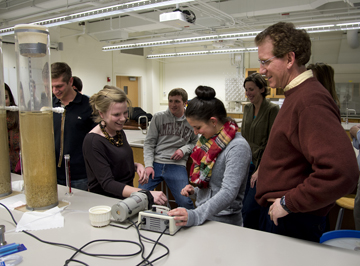March 1, 2013
Multidisciplinary team seeks sustainable water treatment solution
 |
|
Nursing
students Emily Barrett (left) and Danielle LeRose prepare to test a water
sample as Ernest "Chip" Blatchley, professor of civil engineering and
environmental and ecological engineering, looks on. The group, composed of
engineering, nursing, science and agriculture students and faculty, is
collaborating on a water treatment project intended for the Dominican Republic
town of La Torre. (Purdue University photo/Mark Simons)
|
A team built across several of Purdue's disciplines is working to create lasting solutions for clean water in developing countries.
Though many other water treatment systems have been implemented before, principal investigator Ernest "Chip" Blatchley, professor of civil engineering and environmental and ecological engineering, says many have failed due to their narrow engineering focus.
"There is all sorts of water quality hardware sitting around in developing countries that has been abandoned by local communities," he says. "There are a number of nontechnical factors that influence how well or poorly some project is going to be assimilated by a community."
To overcome nontechnical issues such as the social, political, cultural and economic constraints on using the equipment, Purdue's group is a collaboration of professors, graduate students, and undergraduate students from civil engineering, environmental and ecological engineering, nursing, biology, food science and agricultural economics.
The team is focused on creating a sustainable water treatment system for a school in the Dominican Republic town of La Torre.
The project is funded through the People, Prosperity, and the Planet student design competition for sustainability, hosted by the Environmental Protection Agency. Currently, the project is in the initial stages of studying feasibility. In April, a team of students will travel to Washington, D.C., to compete during the National Sustainable Design Expo for an additional $90,000 in federal funding for implementation.
Group members have been working since the fall semester to learn about several aspects of the problem, gain a base understanding of the participating disciplines, and learn about the culture of La Torre. They have also been working with Aqua Clara International, a Michigan-based nonprofit corporation working to create sustainable solutions in developing countries.
During spring break, 14 students and three professors will travel to the Dominican Republic to learn more about the town and culture, survey the school, and study the water quality in the area.
Blatchley says the trip is intended to help to build a relationship with the people of the town, which will help to ensure the sustainability of the project.
"One of the key things about having success in a development activity is to establish a relationship with people in the community and gain their trust," he says. "One of the big things we're going to be doing is trying to learn who they are, what they're all about, and have them do the same thing with us. We want to get to know each other."
If the team wins the additional project funding, it will spend the next two to three years in the implementation stage of the project. Student members have applied for several other grants to keep the project moving even without EPA financial backing.
With the help of Aqua Clara International, the team will work with members of the La Torre community to build the systems out of materials commonly found in the area. They will also help to start small businesses that will sell excess water at a fair price and help to fuel the local economy.
Vicki Simpson, clinical assistant professor in the School of Nursing, says the town also will benefit economically with enhanced work efficiency and education quality, due to improved health.
"People who aren't healthy either can't go to school or work, or they go and cannot perform well," she says. "Along with preventing death from illnesses, a clean water system promotes better learning and job productivity."
Although professors from each discipline have been involved in the course and project, the project is largely student-run.
Kevin Camp, a graduate student in agricultural economics, says the majority of the ideas, work, and deadlines have been created through the efforts of the graduate and undergraduate students.
"Last semester was very structured, with lessons from the professors," he says. "However, this semester is very shared in terms of input. At this point, ideas for the trip and experiments are just as valued coming from the students as they are from the professors."
For example, the undergraduate students from engineering backgrounds designed, developed, and trained the rest of the team on the sand filters and water-bound e-coli tests. Students are also responsible for the contest presentation and grant applications.
Blatchley says he has been impressed with the commitment and drive of the students involved with the project.
"For some reason work like this, that connects with people in need, attracts excellent students," he says. "We've just had to point them in the right direction and turn them loose."
Writer: Rachel Florman, rflorman@purdue.edu